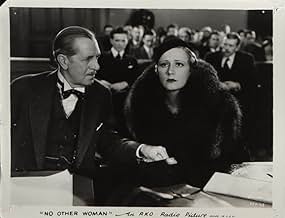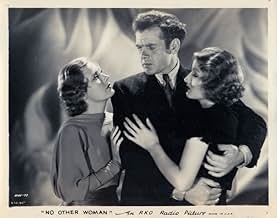A steelworker and his aspiring wife make millions when they become partners in a dyeworks. Unfortunately, success does not bring happiness.A steelworker and his aspiring wife make millions when they become partners in a dyeworks. Unfortunately, success does not bring happiness.A steelworker and his aspiring wife make millions when they become partners in a dyeworks. Unfortunately, success does not bring happiness.
- Awards
- 1 win total
Theodore von Eltz
- Sutherland
- (as Theodore Von Eltz)
Jules Cowles
- Boarder
- (uncredited)
Phyllis Fraser
- Minor Role
- (uncredited)
Arthur Hoyt
- Bridge Player
- (uncredited)
Mary Mason
- Minor Role
- (uncredited)
Featured reviews
Irene Dunne was rarely paired with actors like Charles Bickford. Here he is a handsome, sweaty blue collar man who thinks -- but rarely with anything above his neck. Irene is kind of in love with him but also is loyal to the effete character played by Eric Linden.
Dunne and Bickford are an appealing couple but if ever a couple entered a marriage doomed to failure, it is the two they play.
He shows how dumb he is by throwing over the stylish, intelligent Dunne for Gwyli Andre -- a nobody in the story and in the history of film.
This is a standard women's picture in some ways. In others, it is a powerful drama. It doesn't seem dated and most assuredly warrants watching.
Dunne and Bickford are an appealing couple but if ever a couple entered a marriage doomed to failure, it is the two they play.
He shows how dumb he is by throwing over the stylish, intelligent Dunne for Gwyli Andre -- a nobody in the story and in the history of film.
This is a standard women's picture in some ways. In others, it is a powerful drama. It doesn't seem dated and most assuredly warrants watching.
Irene Dunne was the unquestionable queen of the thirties melodrama ;even when the story is mawkish to a fault, so over the top ,she saves the situation .
A model of a housewife, who helps her husband she cherishes and a young chemist to achieve their American dream,that is to say a dyer workers affair ;very soon (too soon maybe , but the movies were short at the time,being often part of a double-feature),they find themselves thrust to the high society and to a world of luxury.
Miss Dunne,in spite of her fortune,has remained a virtuous lady and she would give it all so as not to be denied the custody of her only child ; the trial would make the movie become thoroughly ridiculous, if it weren't for the actress ' performance, who in her final plea when she's prepared to take all the blame, will win you over; have your box of kleenex besides you.
A model of a housewife, who helps her husband she cherishes and a young chemist to achieve their American dream,that is to say a dyer workers affair ;very soon (too soon maybe , but the movies were short at the time,being often part of a double-feature),they find themselves thrust to the high society and to a world of luxury.
Miss Dunne,in spite of her fortune,has remained a virtuous lady and she would give it all so as not to be denied the custody of her only child ; the trial would make the movie become thoroughly ridiculous, if it weren't for the actress ' performance, who in her final plea when she's prepared to take all the blame, will win you over; have your box of kleenex besides you.
Irene Dunne stars as a factory-town woman who wants a better life (like Barbara Stanwyck in Stella Dallas, Katharine Hepburn in Alice Adams and Joan Crawford in Possessed). She's in love with factory worker Charles Bickford. They marry and she runs a boarding house to make extra money. One of the boarders is a shy immigrant (Eric Linden) who has discovered a great new dye. Dunne talks Bickford into throwing in their savings and open a dye works. They become rich. But Bickford travels a lot and falls into the clutches of a bad woman (Gwili Andre) who wants more than money: marriage.
The court room finale is a doozy with J. Carroll Naish playing a sleazy (Italian in this case) lawyer who has cooked up a scheme to get his girl friend (Andre) married to Bickford. So they line up a bunch of false witnesses against Dunne. But Dunne turns the tables when they try to grab custody of the baby as well. Excellent plot twist.
Dunne is one of the greats, and she's terrific here too. She's even believable as a factory-town girl. Bickford is an acquired taste and I never liked him as a "leading man." Linden is good is his usual "soft" role. And Naish is always fun to hate. Leila Bennett, Hilda Vaughn, and Christian Rub co-star.
No Other Woman is famous as the film that derailed Danish Gwili Andre's career because her character is so nasty. She battled for another decade to regain a foothold in films but only landed small parts. She committed suicide in 1959 by surrounding herself with publicity photos and press clippings and setting them and herself on fire.
The court room finale is a doozy with J. Carroll Naish playing a sleazy (Italian in this case) lawyer who has cooked up a scheme to get his girl friend (Andre) married to Bickford. So they line up a bunch of false witnesses against Dunne. But Dunne turns the tables when they try to grab custody of the baby as well. Excellent plot twist.
Dunne is one of the greats, and she's terrific here too. She's even believable as a factory-town girl. Bickford is an acquired taste and I never liked him as a "leading man." Linden is good is his usual "soft" role. And Naish is always fun to hate. Leila Bennett, Hilda Vaughn, and Christian Rub co-star.
No Other Woman is famous as the film that derailed Danish Gwili Andre's career because her character is so nasty. She battled for another decade to regain a foothold in films but only landed small parts. She committed suicide in 1959 by surrounding herself with publicity photos and press clippings and setting them and herself on fire.
Steel mill worker's daughter Irene Dunne marries mill hand Charles Bickford. He eventually becomes a rich owner of a dye works and takes on New York mistress Gwili Andre. When Miss Andre insists on marriage and Miss Dunne refuses him a divorce, witnesses lie that she is the one having an affair.
It looks as ifthis movie had been more ambitious at one point; certainly, the marriage reception, which looks very Polish, shows the attention to detail that director J. Walter Ruben liked to take. But its short length -- impelled by Slavko Vorkapich's transitional montages -- keep it too brisk for anyone to get any real flavor out of its bite-sized portions. With Eric Linden, Christian Rub, Leila Bennet, and J. Carrol Naish.
It looks as ifthis movie had been more ambitious at one point; certainly, the marriage reception, which looks very Polish, shows the attention to detail that director J. Walter Ruben liked to take. But its short length -- impelled by Slavko Vorkapich's transitional montages -- keep it too brisk for anyone to get any real flavor out of its bite-sized portions. With Eric Linden, Christian Rub, Leila Bennet, and J. Carrol Naish.
No Other Woman (1933)
** 1/2 (out of 4)
A poor married couple (Irene Dunne, Charles Bickford) get rich after making a steel dye but then their marriage starts to fall apart due to him finding a mistress in New York. There's nothing overly special about this film but it runs a fast 58-minutes, which is almost a tad bit too much time. The story is very predictable right down to the showdown in court towards the end. The real reason to watch this is due to the performances of Dunne and Bickford. The two have a lot of chemistry together and make for a great couple. Bickford steals the show as the iron hard man who doesn't know what to do when he gets all that money. J. Carrol Naish has a small role. Previously filmed in 1918 and 1925.
** 1/2 (out of 4)
A poor married couple (Irene Dunne, Charles Bickford) get rich after making a steel dye but then their marriage starts to fall apart due to him finding a mistress in New York. There's nothing overly special about this film but it runs a fast 58-minutes, which is almost a tad bit too much time. The story is very predictable right down to the showdown in court towards the end. The real reason to watch this is due to the performances of Dunne and Bickford. The two have a lot of chemistry together and make for a great couple. Bickford steals the show as the iron hard man who doesn't know what to do when he gets all that money. J. Carrol Naish has a small role. Previously filmed in 1918 and 1925.
Did you know
- TriviaAt the wedding reception, guest are seen pinning money on Anna's dress before dancing with her. This was a common practice in Polish immigrant communities and was called the "money dance." Sometimes the bride wears an apron or carries a purse in which to place the money. The purpose of the money is for the couple's honeymoon, to set up housekeeping, or for the couple's first-born child.
- GoofsThe shadow of the camera can be seen falling on people at the wedding as it moves around the room.
- Quotes
Anna Stanley: To your dying day, you'll work in the mill.
Jim Stanley: Sure! Why not?
Anna Stanley: Like your father did, and mine. And your children will go on doing the same thing, and their children...
Jim Stanley: Hey - what is all this tripe?
- ConnectionsRemake of Just a Woman (1925)
Details
- Release date
- Country of origin
- Language
- Also known as
- No Other Woman
- Filming locations
- Birmingham, Alabama, USA(TCI Ensley Works - steel mill exteriors after wedding reception)
- Production company
- See more company credits at IMDbPro
- Runtime
- 58m
- Color
- Aspect ratio
- 1.37 : 1
Contribute to this page
Suggest an edit or add missing content






































